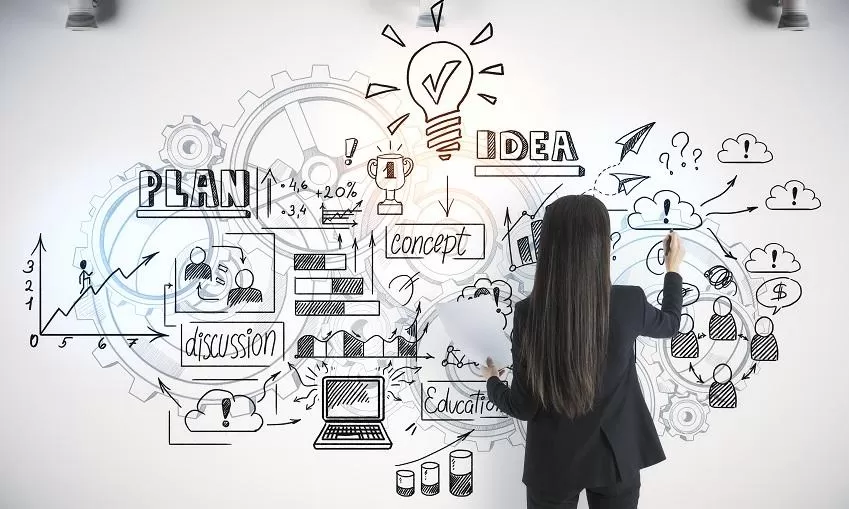Articles
-
 Take a step back from proposal mechanics. Becoming a better proposal manager has more to do with understanding the goals and what’s required for people to improve their performance than it does with making the trains run on time. A conductor doesn’t just keep the musicians in synch. A conductor helps them be more than the sum of their individual parts. Here’s how to apply that to proposal management: Decide on what kind of proposal manager you want to be. You may not realize it, but there
Take a step back from proposal mechanics. Becoming a better proposal manager has more to do with understanding the goals and what’s required for people to improve their performance than it does with making the trains run on time. A conductor doesn’t just keep the musicians in synch. A conductor helps them be more than the sum of their individual parts. Here’s how to apply that to proposal management: Decide on what kind of proposal manager you want to be. You may not realize it, but there- 0 comments
- 1,428 views
-
 The purpose of this article isn’t to tell you how to be an executive. You already know that. And if you don’t, you’ll be hearing soon from all the needy voices. The purpose of this article is to share some insights and lessons learned related to business development, capture, and proposals that can help you grow your organization and be more prosperous. This article is not about the details of those functions, but what those functions need from their executive sponsor. This isn’t obvious stuff,
The purpose of this article isn’t to tell you how to be an executive. You already know that. And if you don’t, you’ll be hearing soon from all the needy voices. The purpose of this article is to share some insights and lessons learned related to business development, capture, and proposals that can help you grow your organization and be more prosperous. This article is not about the details of those functions, but what those functions need from their executive sponsor. This isn’t obvious stuff,- 0 comments
- 1,014 views
-
 When you recycle proposal content, you can’t rely on people to simply tailor it. You can’t rely on them because you can’t count on them to be aware of everything that has changed. Unless you tell them. Re-using proposal content requires more than just updating it. It requires changing the context to reflect everything that has changed about the customer, your company, your offering, the competitive environment, and the external world. People often think nothing has changed. Sometime
When you recycle proposal content, you can’t rely on people to simply tailor it. You can’t rely on them because you can’t count on them to be aware of everything that has changed. Unless you tell them. Re-using proposal content requires more than just updating it. It requires changing the context to reflect everything that has changed about the customer, your company, your offering, the competitive environment, and the external world. People often think nothing has changed. Sometime- 0 comments
- 1,743 views
-
 The RFP is just one source of requirements that drive what you should offer in your proposal. If all you do is design an offering that responds to what is in the RFP, it will be at a competitive disadvantage compared to a proposal submitted by someone with a deeper understanding of the customer and their requirements. To prepare the winning offer, in addition to the RFP, you need to consider: What matters to the customer? The customer will make their selection not only on what “meets the
The RFP is just one source of requirements that drive what you should offer in your proposal. If all you do is design an offering that responds to what is in the RFP, it will be at a competitive disadvantage compared to a proposal submitted by someone with a deeper understanding of the customer and their requirements. To prepare the winning offer, in addition to the RFP, you need to consider: What matters to the customer? The customer will make their selection not only on what “meets the- 0 comments
- 6,328 views
-
 Your proposal should not be about you. Compare these two approaches to proposal writing: Our approach is to do this and then we do that. We can do this well because we are so qualified. You will get all this and as a result things will be much better for you and it will be easier for you to do so much more. If you’re talking to a salesperson about something you need, which approach do you want to hear? What does the customer really want? How should you say things in a
Your proposal should not be about you. Compare these two approaches to proposal writing: Our approach is to do this and then we do that. We can do this well because we are so qualified. You will get all this and as a result things will be much better for you and it will be easier for you to do so much more. If you’re talking to a salesperson about something you need, which approach do you want to hear? What does the customer really want? How should you say things in a- 0 comments
- 1,864 views
-
 Sometimes why you are proposing something says more about the value than a description of what you are proposing. Simply claiming value is both easy and meaningless. How many times has every company bidding claimed to be the “best value?” Substantiating your value proposition is where you win or lose. While your approach delivers the value, the reason why you chose that approach is what explains and substantiates the value in what you are offering. “We deliver” or “Our approach delivers” F
Sometimes why you are proposing something says more about the value than a description of what you are proposing. Simply claiming value is both easy and meaningless. How many times has every company bidding claimed to be the “best value?” Substantiating your value proposition is where you win or lose. While your approach delivers the value, the reason why you chose that approach is what explains and substantiates the value in what you are offering. “We deliver” or “Our approach delivers” F- 0 comments
- 1,925 views
-
 These are some of my “go to” ways of expressing value, focusing on benefits, and differentiating during proposal writing. When I’ve decided what to write to achieve RFP compliance and am pondering how to take it further and win in writing, they often come to mind. Winning by giving the customer something more The following phrases work like formulas that combine things in ways that raise the bar and help make your proposal more persuasive and more competitive. They help you establish t
These are some of my “go to” ways of expressing value, focusing on benefits, and differentiating during proposal writing. When I’ve decided what to write to achieve RFP compliance and am pondering how to take it further and win in writing, they often come to mind. Winning by giving the customer something more The following phrases work like formulas that combine things in ways that raise the bar and help make your proposal more persuasive and more competitive. They help you establish t- 0 comments
- 2,204 views
-
 Sometimes it’s good to put the proposal management process aside and just look at what is the minimum required to write a proposal. While there are a lot of logistical and other considerations for a proposal that should be addressed early, today we are just looking at it from the perspective of the proposal writer. The proposal writer just wants to focus on completing their assignment. So can we start writing now please? If you start by putting some words down on paper, anticipating that yo
Sometimes it’s good to put the proposal management process aside and just look at what is the minimum required to write a proposal. While there are a lot of logistical and other considerations for a proposal that should be addressed early, today we are just looking at it from the perspective of the proposal writer. The proposal writer just wants to focus on completing their assignment. So can we start writing now please? If you start by putting some words down on paper, anticipating that yo- 0 comments
- 7,413 views
-
 You can't credibly claim thought leadership in a proposal. It’s too late. If the customer doesn't already think of you as a thought leader, what will they think about that unsubstantiated claim? At best it won't affect your evaluation score one bit. At worst it will hurt your credibility. Doesn't being a thought leader require providing leading thoughts? What does claiming leading thoughts and not providing any do for your image? Thought leadership is more about trust than knowledge and not
You can't credibly claim thought leadership in a proposal. It’s too late. If the customer doesn't already think of you as a thought leader, what will they think about that unsubstantiated claim? At best it won't affect your evaluation score one bit. At worst it will hurt your credibility. Doesn't being a thought leader require providing leading thoughts? What does claiming leading thoughts and not providing any do for your image? Thought leadership is more about trust than knowledge and not- 2 comments
- 6,620 views
-
Expectation management: You should make sure that what is expected of you and what you are expecting are both clearly communicated. If you are not sure, then ask for clarification. When receiving an assignment, communicate your acceptance. This should include acknowledging both the deadlines and the scope of the assignment. After you have had a chance to review the Content Plan in detail, you should communicate any issues that may arise. This may include t
- 0 comments
- 214 views
-
If you are like me, you learned the basic five-paragraph essay format (and about a dozen variations) in school. You remember: introductory paragraph, three supporting paragraphs, and concluding paragraph. Most variations follow the same concept: introduce, support, conclude. If you are writing a proposal, this is completely backwards. Consider: The goal of a proposal is to persuade — here is what I want you to conclude, and here’s why. Most proposal evaluators don’t want to be
- 0 comments
- 449 views
-
 The easy answer is all those regulations. Another good one is whether full compliance is mandatory or not. But the real answer is something different. It’s something that people struggle with. You can look up the regulations. You can learn to comply like a robot. But the most important difference will determine whether your proposal is a success or a failure. How do you get your proposal started? In both government and commercial proposals, the proposal should really start before the RFP
The easy answer is all those regulations. Another good one is whether full compliance is mandatory or not. But the real answer is something different. It’s something that people struggle with. You can look up the regulations. You can learn to comply like a robot. But the most important difference will determine whether your proposal is a success or a failure. How do you get your proposal started? In both government and commercial proposals, the proposal should really start before the RFP- 0 comments
- 7,368 views
-
 If you don’t want your proposal to look and sound like every other proposal the customer will have to read, then you need to get good at reading your proposal like the customer, and being honest about what you see… Read your proposal and look for the differentiators. Ask if other companies will claim the same things, whether or not they are true, whether or not your claim is stronger. If they can say the same things, you’ll all sound the same. Differentiators are the secret to writing a
If you don’t want your proposal to look and sound like every other proposal the customer will have to read, then you need to get good at reading your proposal like the customer, and being honest about what you see… Read your proposal and look for the differentiators. Ask if other companies will claim the same things, whether or not they are true, whether or not your claim is stronger. If they can say the same things, you’ll all sound the same. Differentiators are the secret to writing a- 0 comments
- 1,863 views
-
 The way we think about proposal efficiency has a major impact on the results we achieve. Instead of managing proposals as a cost to be minimized, we should manage them as an investment. Let’s start with how NOT to measure proposal efficiency When we think of proposal efficiency as doing more proposals with less effort, we ignore ROI and focus on lowering costs using an equation like: total cost of proposals divided by the number of submissions total value of wins divided by
The way we think about proposal efficiency has a major impact on the results we achieve. Instead of managing proposals as a cost to be minimized, we should manage them as an investment. Let’s start with how NOT to measure proposal efficiency When we think of proposal efficiency as doing more proposals with less effort, we ignore ROI and focus on lowering costs using an equation like: total cost of proposals divided by the number of submissions total value of wins divided by- 0 comments
- 1,418 views
-
 It’s as easy as 1, 2, 3. Most proposal processes are created during proposal development. This is a bit like building the airplane while trying to fly it. But needs must. I’ve often been asked to help a company with a proposal only to find that there basically was no process and I’d have to make one up while doing the proposal. Having written most of what you see on PropLIBRARY makes it easier for me to do this. But it also gives the insight needed to help others in similar circumstances.
It’s as easy as 1, 2, 3. Most proposal processes are created during proposal development. This is a bit like building the airplane while trying to fly it. But needs must. I’ve often been asked to help a company with a proposal only to find that there basically was no process and I’d have to make one up while doing the proposal. Having written most of what you see on PropLIBRARY makes it easier for me to do this. But it also gives the insight needed to help others in similar circumstances.- 0 comments
- 1,192 views
-
 I blame Henry Ford for the idea of the proposal assembly line. Although a case could be made that it was Frederick Winslow Taylor and the time and motion study method for management. But hardly anyone recognizes Frederick Winslow Taylor, and sooner or later everyone working in proposals meets someone who suggests setting up an assembly line. Using the assembly line model for proposals is a great way to lose money on proposals. It puts the emphasis on getting proposals out the door instead o
I blame Henry Ford for the idea of the proposal assembly line. Although a case could be made that it was Frederick Winslow Taylor and the time and motion study method for management. But hardly anyone recognizes Frederick Winslow Taylor, and sooner or later everyone working in proposals meets someone who suggests setting up an assembly line. Using the assembly line model for proposals is a great way to lose money on proposals. It puts the emphasis on getting proposals out the door instead o- 0 comments
- 1,343 views
-
The following items can be used as a quality criteria checklist to determine whether what you have written is a proposal or a brochure. A brochure gives people something to buy. A proposal gives them something to consider and helps them reach a decision about it. Good brochure copy makes for bad proposal writing. You can use this list to determine whether what you have written reads like a brochure or reads like a proposal: Does it read like it is primarily an offer to sell the customer so
- 0 comments
- 703 views
-
 The scope of work required to achieve a high proposal win rate is bigger than one person. If your company depends on winning proposals for its revenue, you may need a Proposal Department instead of a proposal person. When to expand is really an ROI decision. When it comes to proposals, you do more to maximize your ROI by winning more than by keeping expenses low. It's time to expand your proposal department when adding another person will enable you to win far more than that person will cos
The scope of work required to achieve a high proposal win rate is bigger than one person. If your company depends on winning proposals for its revenue, you may need a Proposal Department instead of a proposal person. When to expand is really an ROI decision. When it comes to proposals, you do more to maximize your ROI by winning more than by keeping expenses low. It's time to expand your proposal department when adding another person will enable you to win far more than that person will cos- 0 comments
- 6,466 views
-
 What is a pink team proposal review? We define a pink team proposal review as an assessment of whether what you plan to write will produce the proposal that your company wants to submit, before you write it. This ensures that people know the points they need to make in order to win, and sets the stage for reviews that lead to improvements instead of re-writes. A simpler version of this would be to determine whether you are ready to start writing the proposal. Unfortunately, at a lot of comp
What is a pink team proposal review? We define a pink team proposal review as an assessment of whether what you plan to write will produce the proposal that your company wants to submit, before you write it. This ensures that people know the points they need to make in order to win, and sets the stage for reviews that lead to improvements instead of re-writes. A simpler version of this would be to determine whether you are ready to start writing the proposal. Unfortunately, at a lot of comp- 0 comments
- 6,392 views
-
 While proposal management obsesses over process, advanced proposal management focuses on maximizing ROI and realizes that requires more than process alone. We love to obsess over the proposal process. We talk about it as if it is how proposals are done. However, once a proposal manager gains a few years’ experience, every one I’ve ever spoken to realizes that success requires a lot more than just steps. A lot of proposal issues relate to working through other people, especially across orga
While proposal management obsesses over process, advanced proposal management focuses on maximizing ROI and realizes that requires more than process alone. We love to obsess over the proposal process. We talk about it as if it is how proposals are done. However, once a proposal manager gains a few years’ experience, every one I’ve ever spoken to realizes that success requires a lot more than just steps. A lot of proposal issues relate to working through other people, especially across orga- 0 comments
- 1,301 views

